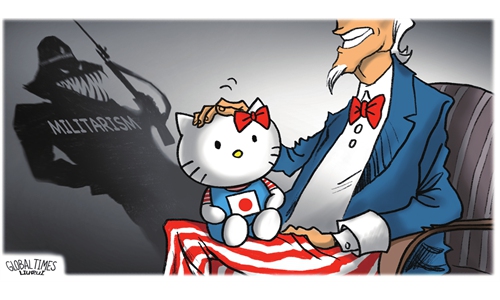
Flags of G7 countries at Palazzo Pitti, Italy Photo: VCG
Japan, which will host the upcoming Group of Seven (G7) foreign ministerial talks, is apparently trying hard to lure other G7 members to issue a joint statement targeting China and Russia, with its media recently releasing a series of major issues in advance that could be mentioned in the statement.
Following the US strategy, Japan's attempts to hype the "China threat" expose its determination to collude with forces outside the Asia-Pacific region to counter China, but Chinese observers believe that those G7 members are not of one mind. Germany and France, for example, which follow a more independent diplomacy, focus on economic interests in the region, and their strategic interests are not framed as an inevitable competition with China.
The Yomiuri Shimbun on Thursday cited Japanese government sources as saying that foreign ministers from the G7 nations plan to call on the international community to refrain from tests in which they destroy satellites with missiles, a request aimed at deterring China and Russia from developing the so-called anti-satellite weapons.
It is expected to be stipulated in a joint statement after the ministers' meeting in Karuizawa, Nagano Prefecture, from Sunday to Tuesday, the sources said.
Li Haidong, a professor with the Institute of International Relations at the China Foreign Affairs University, told the Global Times on Thursday that Japan, which hypes the "space threat from China and Russia," is making up excuses to enable hegemony by the US and its allies in space.
Japan is actively supporting the US in shifting responsibility, a reflection of the US-led camp's Cold War mentality, as it is the US that is the biggest threat to space security, Li said.
The US government has made great efforts in the development and deployment of offensive outer space weapons, which makes a joke out of the potential call by G7 foreign ministers not to conduct destructive anti-satellite tests, observers said.
Also, the joint statement may express serious concerns about the situation in the East China Sea and South China Sea. The statement will state opposition to "China's attempts to unilaterally change the status quo" and the importance of maintaining peace and stability in the Taiwan Straits, the Yomiuri Shimbun noted.
The outcome of the foreign ministerial talks will lay the groundwork for the G7 summit from May 19 to 21 in Hiroshima.
However, observers pointed out that divergences remain among the G7 members.
Japan's intention is very clear, that is to draw Western countries, especially European allies, into the competition with China in the Asia-Pacific region, an idea that is in line with the US strategy, Li said. But members such as Germany, France and even Italy are not likely to blindly follow the US and Japan.
Even though they will issue a joint statement on China-related issues, each member state may have its own interpretation and approach to this statement.
"Germany and France focus on economic interests in the Asia-Pacific region, while their strategic interests are not framed by the inevitable competition with China. Meanwhile, Japan and the US have labeled China as a strategic challenge, and containing China is their goal in the Asia-Pacific," Li stressed.
Germany, France and even Italy are likely to play a restraining role in the competition against China provoked by the US and Japan so as to prevent them from making irrational moves in the region, Li believes.

